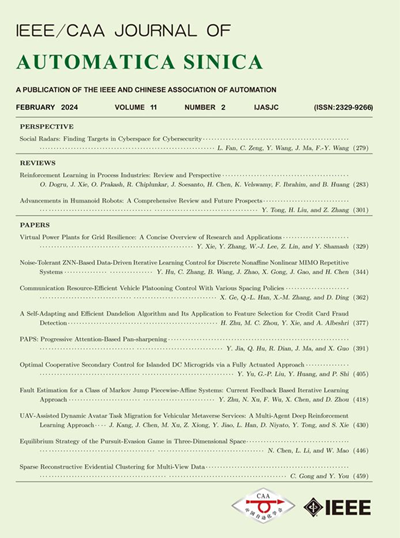System Identification in the Network Era: A Survey of Data Issues and Innovative Approaches
IF 19.2
1区 计算机科学
Q1 AUTOMATION & CONTROL SYSTEMS
引用次数: 0
Abstract
System identification is a data-driven modeling technique that originates from the control field. It constructs models from data to mimic the behavior of dynamic systems. However, in the network era, scenarios such as sensor malfunctions, packet loss, cyber-attacks, and big data affect the quality, integrity, and security of the data. These data issues pose significant challenges to traditional system identification methods. This paper presents a comprehensive survey of the emergent challenges and advances in system identification in the network era. It explores cutting-edge methodologies to address data issues such as data loss, outliers, noise and nonlinear system identification for complex systems. To tackle the data loss, the methods based on imputation and likelihood-based inference (e.g., expectation maximization) have been employed. For outliers and noise, methods like robust regression (e.g., least median of squares, least trimmed squares) and low-rank matrix decomposition show progress in maintaining data integrity. Nonlinear system identification has advanced through kernel-based methods and neural networks, which can model complex data patterns. Finally, this paper provides valuable insights into potential directions for future research.网络时代的系统识别:数据问题与创新方法综述
系统识别是一种起源于控制领域的数据驱动建模技术。它从数据中构建模型来模拟动态系统的行为。但在网络时代,传感器故障、丢包、网络攻击、大数据等场景会影响数据的质量、完整性和安全性。这些数据问题对传统的系统识别方法提出了重大挑战。本文全面介绍了网络时代系统识别的新挑战和新进展。它探讨了前沿的方法来解决数据问题,如数据丢失,异常值,噪声和复杂系统的非线性系统识别。为了解决数据丢失问题,采用了基于imputation和基于似然推理(如期望最大化)的方法。对于异常值和噪声,鲁棒回归(例如,最小平方中位数,最小裁剪平方)和低秩矩阵分解等方法在保持数据完整性方面取得了进展。非线性系统辨识主要通过基于核的方法和神经网络进行,这些方法可以对复杂的数据模式进行建模。最后,本文对未来的研究方向提出了有价值的见解。
本文章由计算机程序翻译,如有差异,请以英文原文为准。
求助全文
约1分钟内获得全文
求助全文
来源期刊

Ieee-Caa Journal of Automatica Sinica
Engineering-Control and Systems Engineering
CiteScore
23.50
自引率
11.00%
发文量
880
期刊介绍:
The IEEE/CAA Journal of Automatica Sinica is a reputable journal that publishes high-quality papers in English on original theoretical/experimental research and development in the field of automation. The journal covers a wide range of topics including automatic control, artificial intelligence and intelligent control, systems theory and engineering, pattern recognition and intelligent systems, automation engineering and applications, information processing and information systems, network-based automation, robotics, sensing and measurement, and navigation, guidance, and control.
Additionally, the journal is abstracted/indexed in several prominent databases including SCIE (Science Citation Index Expanded), EI (Engineering Index), Inspec, Scopus, SCImago, DBLP, CNKI (China National Knowledge Infrastructure), CSCD (Chinese Science Citation Database), and IEEE Xplore.
 求助内容:
求助内容: 应助结果提醒方式:
应助结果提醒方式:


